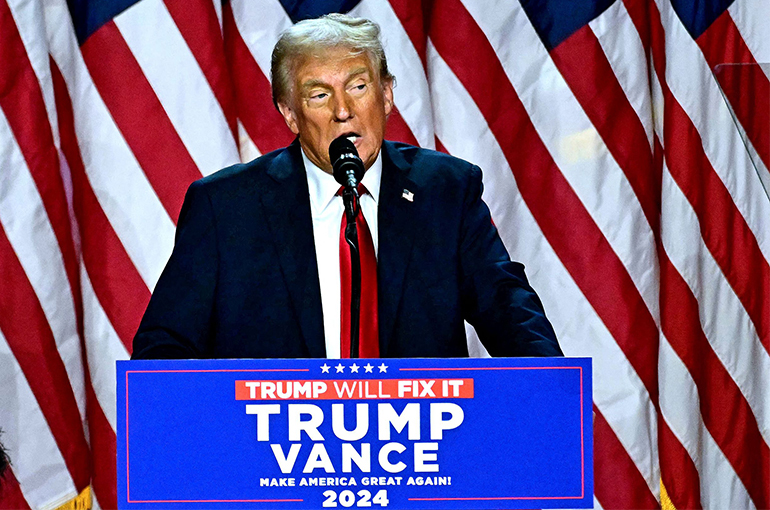 Chinese Firms Hasten Global Expansion Ahead of Potential Rise in US-China Trade Frictions
Chinese Firms Hasten Global Expansion Ahead of Potential Rise in US-China Trade Frictions(Yicai) Dec. 17 -- Donald Trump's election as US president may lead to even tighter trade restrictions on Chinese companies, forcing them to accelerate their global expansion, which will bring both new challenges and opportunities, experts said at a recent conference.
Trump's second term in the White House could bring more negative policies targeting China, including tariffs, export controls, and foreign investment scrutiny, as indicated by his campaign policies, Zhao Hong, a former World Trade Organization appellate body judge and Peking University law professor, told Yicai during the 2024 Conference on Customs Clearance and Compliance Management.
US-China trade friction during Trump's first term had already prompted Chinese companies to explore overseas markets, with supply chain firms following suit, Jiang Weiqian, chairperson at Jiangsu Yuetong Certified Public Accountants, said at the conference held in the Chinese city of Wuxi on Dec. 12 and 13.
Their overseas expansion has evolved from building relations with clients to actively seeking more global market presence, Jiang noted. “It's not just large corporations anymore. More private enterprises are seeking international opportunities," Jiang said, pointing out that intensifying domestic competition and global supply chain restructuring are also key drivers.
Higher tariffs under a second Trump administration would probably hasten the overseas expansion of Chinese firms, according to Pan Hongbin, chairman of JD-Link International Logistics. Many foreign clients have already accepted negotiated price rises resulting from existing tariffs from Trump's first term and the pandemic, Pan said, but further increases would necessitate relocation.
Companies may shift from a ‘China + One’ to a ‘China + Two’ strategy, with investments in multiple countries and production bases in target markets, Pan said. His company focuses on supply chains connected to the Belt and Road Initiative, which he believes will remain relatively stable regardless of Trump's policies.
Wuxi-based JD-Link has already set up operations in Vietnam and Cambodia and is now exploring Central Asian opportunities, he noted.
‘Egg Basket’
Experts also discussed key challenges facing Chinese companies when expanding overseas, including compliance issues and selection of the right destination.
"Companies cannot put all their eggs in one basket and need to diversify their layout to spread risks,” Pan said. He highlighted Southeast Asia, Central Asia, and the Middle East as emerging hotspots for Chinese businesses due to their market potential and cost advantages, adding that they also offer valuable resources and policy incentives.
Roger Chen, partner at Deloitte Tax Shanghai, warned that simply establishing factories overseas does not guarantee that firms can sidestep tariffs. The US customs authorities' interpretation of rules of origin remains unpredictable, potentially tracking it back to core components such as semiconductors.
“High-tech companies with complex supply chains are particularly vulnerable to these challenges," Chen pointed out.
Companies should carry out in-depth risk assessments when setting up overseas operations, considering factors such as tariffs, supply chains, markets, and human resources. "Chinese enterprises need to be well-prepared and diversify their market presence to mitigate trade risks,” Chen advised.
‘Strong Support’
China is actively promoting the construction of smart customs to improve clearance efficiency, said Tang Yongqing, general manager of the Smart Customs Affairs Division at Shanghai Jinghong International Logistics, adding that the greater convenience offered by the international trade single window is also being promoted in Southeast Asia. This provides strong support for Chinese companies to accelerate their global expansion, Tang said.
When discussing the rapidly developing but still challenging cross-border e-commerce trade, Tang also mentioned that China’s customs authorities are strengthening their supervision of transborder e-commerce platforms, requiring them to standardize declarations and eliminate gray area practices.
The China Customs Brokers Association is forming an alliance to support companies' overseas expansion, according to Secretary-General Zhang Peng. The association recently approved a proposal for a smart customs affairs committee to align with international trade standards, but accessing foreign customs interfaces remains challenging despite technical readiness.
Western countries dominate global customs’ electronic operating systems, Zhang added, and while China has the technical capability, gaining access to their customs interfaces still requires significant effort.
Editor: Tom Litting